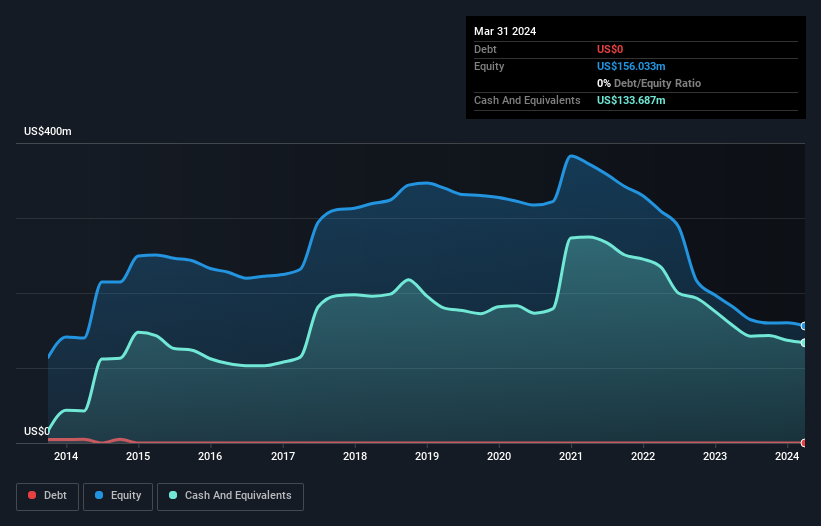- United States
- /
- Interactive Media and Services
- /
- NasdaqGS:TRUE
We're Hopeful That TrueCar (NASDAQ:TRUE) Will Use Its Cash Wisely

Just because a business does not make any money, does not mean that the stock will go down. For example, although Amazon.com made losses for many years after listing, if you had bought and held the shares since 1999, you would have made a fortune. Having said that, unprofitable companies are risky because they could potentially burn through all their cash and become distressed.
Given this risk, we thought we'd take a look at whether TrueCar (NASDAQ:TRUE) shareholders should be worried about its cash burn. For the purpose of this article, we'll define cash burn as the amount of cash the company is spending each year to fund its growth (also called its negative free cash flow). We'll start by comparing its cash burn with its cash reserves in order to calculate its cash runway.
View our latest analysis for TrueCar
Does TrueCar Have A Long Cash Runway?
A company's cash runway is calculated by dividing its cash hoard by its cash burn. As at March 2024, TrueCar had cash of US$134m and no debt. Importantly, its cash burn was US$34m over the trailing twelve months. Therefore, from March 2024 it had 3.9 years of cash runway. A runway of this length affords the company the time and space it needs to develop the business. Depicted below, you can see how its cash holdings have changed over time.

How Well Is TrueCar Growing?
We reckon the fact that TrueCar managed to shrink its cash burn by 25% over the last year is rather encouraging. Revenue also improved during the period, increasing by 5.0%. Considering the factors above, the company doesn’t fare badly when it comes to assessing how it is changing over time. Clearly, however, the crucial factor is whether the company will grow its business going forward. For that reason, it makes a lot of sense to take a look at our analyst forecasts for the company.
How Hard Would It Be For TrueCar To Raise More Cash For Growth?
We are certainly impressed with the progress TrueCar has made over the last year, but it is also worth considering how costly it would be if it wanted to raise more cash to fund faster growth. Issuing new shares, or taking on debt, are the most common ways for a listed company to raise more money for its business. Many companies end up issuing new shares to fund future growth. We can compare a company's cash burn to its market capitalisation to get a sense for how many new shares a company would have to issue to fund one year's operations.
TrueCar's cash burn of US$34m is about 14% of its US$242m market capitalisation. Given that situation, it's fair to say the company wouldn't have much trouble raising more cash for growth, but shareholders would be somewhat diluted.
How Risky Is TrueCar's Cash Burn Situation?
The good news is that in our view TrueCar's cash burn situation gives shareholders real reason for optimism. Not only was its cash burn reduction quite good, but its cash runway was a real positive. Based on the factors mentioned in this article, we think its cash burn situation warrants some attention from shareholders, but we don't think they should be worried. Taking an in-depth view of risks, we've identified 2 warning signs for TrueCar that you should be aware of before investing.
Of course, you might find a fantastic investment by looking elsewhere. So take a peek at this free list of interesting companies, and this list of stocks growth stocks (according to analyst forecasts)
Valuation is complex, but we're here to simplify it.
Discover if TrueCar might be undervalued or overvalued with our detailed analysis, featuring fair value estimates, potential risks, dividends, insider trades, and its financial condition.
Access Free AnalysisHave feedback on this article? Concerned about the content? Get in touch with us directly. Alternatively, email editorial-team (at) simplywallst.com.
This article by Simply Wall St is general in nature. We provide commentary based on historical data and analyst forecasts only using an unbiased methodology and our articles are not intended to be financial advice. It does not constitute a recommendation to buy or sell any stock, and does not take account of your objectives, or your financial situation. We aim to bring you long-term focused analysis driven by fundamental data. Note that our analysis may not factor in the latest price-sensitive company announcements or qualitative material. Simply Wall St has no position in any stocks mentioned.
About NasdaqGS:TRUE
TrueCar
Operates as an internet-based information, technology, and communication services company in the United States.
Excellent balance sheet and fair value.
Similar Companies
Market Insights
Community Narratives




